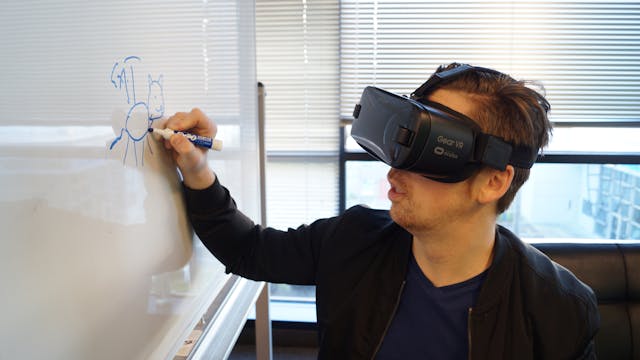The field of User Experience (UX) Design continues to evolve rapidly, driven by technological advancements and ever-changing user expectations. As a private university in Germany offering a Master's degree in UX Management and Design, we are uniquely positioned to explore the key trends shaping the future of UX. In this blog post, we will highlight the most significant UX Design trends and predictions for 2025 and provide insights for those looking to stay ahead in this dynamic industry.
1. AI-powered personalisation
Artificial intelligence (AI) is set to play a pivotal role in UX Design in 2025. AI-driven systems will deliver hyper-personalised user experiences by analysing real-time data and adapting interfaces to individual user needs. Designers will increasingly collaborate with AI to create predictive and adaptive interfaces, ensuring seamless and intuitive interactions.
How to prepare:
- Gain proficiency in AI and machine learning tools relevant to UX.
- Learn to design dynamic and adaptive user interfaces.
2. Immersive experiences with AR and VR
Augmented reality (AR) and virtual reality (VR) are moving beyond niche applications and becoming central to mainstream UX Design. From e-commerce to education, these technologies will redefine user commitment by blending physical and digital environments.
Prediction for 2025:
UX designers will focus on creating more accessible AR/VR experiences, ensuring inclusivity and usability across diverse user groups.

3. Sustainability in UX Design
As sustainability becomes a global priority, digital products will need to align with eco-conscious practices. This trend will influence UX Design through energy-efficient interfaces, minimalistic designs and features that encourage sustainable user behaviour.
Design strategies:
- Opt for lightweight digital products that reduce energy consumption.
- Include features promoting environmentally friendly actions.
4. Voice and conversational interfaces
The demand for voice-activated technology and conversational AI will continue to grow. In 2025, UX designers will refine voice and chat interfaces to provide more natural and context-aware interactions.
Emerging focus:
- Multimodal interfaces combining voice, touch and gesture control.
- Enhanced user testing for diverse linguistic and cultural contexts.
5. Ethical and inclusive design
Ethics and inclusivity will remain at the forefront of UX Design. Designers will prioritise accessibility, ensuring digital experiences are usable by people of all abilities. Additionally, data privacy and ethical considerations will shape design decisions.
Key actions:
- Conduct accessibility audits as part of the design process.
- Ensure transparency in data collection and usage.
6. Remote and asynchronous collaboration tools
With hybrid and remote work becoming the norm, the demand for intuitive collaboration tools will continue to grow. UX designers will focus on creating interfaces that facilitate seamless team communication, even across time zones.
Trend insights:
- Tools with AI-enhanced features for task management and communication will dominate.
- Greater emphasis will be on user-friendly designs that reduce cognitive load.

Why study UX Design in 2025?
Staying at the cutting edge of UX Design requires more than technical skills; it demands strategic thinking and a deep understanding of user behaviour. Our Master’s degree in UX Management and Design equips students with the expertise to navigate these trends and lead in a competitive industry.
Study UX Design at PFH
Becoming a UX designer is an exciting and rewarding journey, especially for those who love solving problems, understanding users and creating beautiful digital experiences. We have designed this programme to help you apply the skills you have acquired with your first university degree in the fields of Management, Psychology and Computer Science. Additionally, you will acquire new and interdisciplinary competencies from the fields of Psychology, Business Information Systems and Business Administration. These are not only helpful but essential for a successful career in UX design.
Thanks for taking the time to read our blog post on UX Design trends and predictions for 2025. If you are thinking about studying abroad and pursuing a career in UX Design, take a look at our Master’s degree in User Experience Management & Design.
At PFH we make sure you receive a high-quality education that makes balancing your work and studies easier!
Post summary
- AI-driven personalisation: Adaptive interfaces powered by AI will deliver tailored user experiences.
- Immersive technologies: AR and VR will take user interface interaction to a new level that is much more inclusive and accessible than ever before.
- Sustainable design: Energy-efficient interfaces and eco-conscious features will align with global sustainability goals.
- Voice and multimodal interfaces: Natural, natural voice and gesture-based interactions will become the industry standard.
- Ethical and collaborative design: Accessibility, data ethics, and user-friendly remote collaboration tools will remain priorities for the industry.
